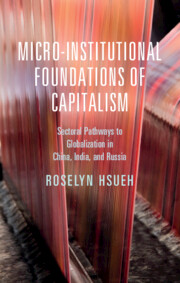‘Roselyn Hsueh has produced a major work featuring an inventive model, the Strategic Value Framework. This schema collapses an array of factors into a powerful template that explicates how three seemingly disparate states variously govern what their leaders perceive to be strategic versus non-strategic industrial sectors. The patterns she uncovers will surely be useful for researchers investigating other countries and other sectors.’
Dorothy J. Solinger - Professor of Political Science, School of Social Sciences, University of California, Irvine
‘Roselyn Hsueh’s book is a tour de force that elevates the standards of comparative political economy. Her argument develops a synoptic and comparative perspective on state priorities, combined with an interactive framework of microlevel sectoral structures and distribution of interested actors. What distinguishes her argument is attention to multiple faces of a state, the perceived value accorded to sectors, combined with governance micro-institutions that vary by sector. It is a must read for scholars of China, India and Russia and of comparative political economy.’
Aseema Sinha - Wagener Chair of South Asian Politics and George R. Roberts Fellow, Claremont McKenna College
‘Micro-institutional Foundations of Capitalism is a highly original, sophisticated, and well-researched study of three large non-Western economies, each analyzed at the sectoral level using Hsueh’s Strategic Value Framework. This book offers a compelling example of how to conduct in-depth research on important cases from different world regions while generating novel theoretical implications for comparative political economy.’
Rudra Sil - Professor of Political Science and Co-Director of the Huntsman Program in International Studies and Business, University of Pennsylvania
‘Roselyn Hsueh has developed an interesting strategic value framework and produced an enormously important book on the state, industrial sectors, and development. She applies her framework in meticulous studies of China, India, and Russia. The resulting comparison of these countries is a feast for the mind.’
Dali L. Yang - William C. Reavis Professor of Political Science, The University of Chicago
‘Hsueh’s new book on comparative economic governance is brilliant. The book’s analysis of multiple sectors in China, India and Russia builds on but goes well beyond existing scholarship on state capacity and economic performance. Its sophisticated analytical framework integrates sectoral and sub-sectoral characteristics with national elites’ intersubjective responses to external and internal pressures. The book’s rigorous, grounded research sets a high standard for qualitative analysis. This is a must read for anyone interested in the political economy of development.’
Richard Doner - Professor Emeritus of Political Science, Emory University
‘Roselyn Hsueh’s book achieves quite a few remarkable feats by underlining the significance of the perception of strategic value of a sector within the state. The book brings ideas and the state back in without undermining the importance of material factors. It is a remarkable feat to compare China, India and Russia in a historically serious way, without compromising methodological rigor. Hsueh is one of those rare scholars who have demonstrated that comparative area studies can marry richness with rigor, without compromising either.’
Rahul Mukherji - Professor and Chair, Modern Politics of South Asia, South Asia Institute, Heidelberg University
‘…highly recommended for all scholars and students interested in political economy and comparative capitalism.’
Yeling Tan
Source: Perspectives on Politics



